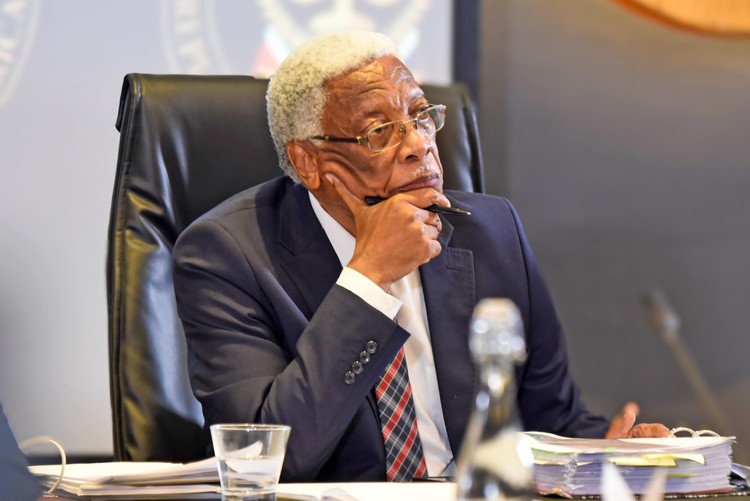
2 July 2025
The Judicial Conduct Tribunal probing a complaint of sexual harassment against Eastern Cape Judge President Selby Mbenenge (above) continued on Tuesday. Archive photo: Office of the Chief Justice / N Mabusela
On Tuesday morning, gender based violence expert Dr Lisa Vetten stuck to her guns that Eastern Cape Judge President Selby Mbenenge had sexually harassed judges’ secretary Andiswa Mengo.
The Judicial Conduct Tribunal is probing sexual harassment allegations against Mbenenge. Vetten was cross-examined on Tuesday by advocate Muzi Sikhakhane, who is representing Mbenenge.
The WhatsApp exchanges between Mbenenge and Mengo showed that he had been persistent, said Vetten, particularly in his request for pictures of Mengo, including nudes, and questions about her sexual position preferences.
Sikhakhane criticised Vetten for “being biased towards the complainant” when, as an expert witness, she was supposed to be neutral.
He also questioned her lack of knowledge of Xhosa culture and language.
He said her analysis had been constrained by the fact that when she had viewed the WhatsApp messages, she had not been given access to Mbenenge’s version of events and had admitted to only “scanning” the transcript of Mengo’s cross-examination (Mbenenge has not yet testified before the tribunal, but has submitted an affidavit).
Mbenenge, in his affidavit before the Tribunal, says the relationship was consensual. Mengo had sent him several flirtatious messages, including some with sexual innuendo, he says. But Mengo, in her testimony, said his approaches were always unwanted.
Vetten has testified that if the Judge President was interested in having a relationship with Mengo, he should have approached it differently.
To this, Sikhakhane asked, “Are you suggesting to a Xhosa man how he should engage in courting? You were venturing into something that is embedded into culture.”
Vetten responded, “I am not giving him advice on his love life. My response was related to my work experience and sexual harassment in the workplace.”
He then asked her if she agreed that illegitimate and false complaints laid by women undermined “all the great work people like you do”.
She responded, “Only if you think that all women are the same and that if one woman lies, it means all women lie.”
“It’s important to try to push back at that type of generalisation. It may have an impact. But we cannot generalise and stigmatise.”
Evidence leader advocate Salome Scheepers asked Vetten if her opinion had changed after she read the transcript of Mengo’s cross-examination overnight.
She said it had not. There were patterns of repeated persistence by Mbenenge even in the face of Mengo saying “no”, although some messages were ambiguous and Mengo was “not the ideal victim”.
After Vetten’s cross-examination ended, Sikhakhane made his opening submissions on behalf of Mbenenge.
He said that he would call three witnesses before Mbenenge testifies.
He told the Tribunal that the only question they needed to settle was whether Mbenenge’s advances were unwanted, or whether he ought to have reasonably known they were not.
He said that Mbenenge’s testimony would clarify the nature of the conversations between him and Mengo. He would also show that some of the allegations made by Mengo, that he had sent certain messages and pictures, were false.
The tribunal ruled on Tuesday that Mbenenge and his witnesses will not be cross-examined by advocate Nasreen Rajab-Budlender, Mengo’s legal representative, briefed by the Women’s Legal Centre.
In terms of the Judicial Service Commission Act and the rules, only those accused of the alleged gross misconduct may be legally represented, not complainants.
Tribunal chair Judge Bernard Ngoepe explained that the panel had “sailed close to the wind” in allowing Mengo’s legal representatives to participate and cross-examine witnesses led by the evidence leader in the “interests of fairness”.
Rajab-Budlender submitted that there was precedent for the complainant’s representative to cross-examine witnesses, despite the Act.
But Ngoepe said the panel was of the view that such a right should not be granted.
“We strove to achieve fairness as far as possible. But troubling is the fact that it would mean that the complainant [Mengo] was only cross-examined once. And the respondent [Mbenenge] and his witnesses would be cross-examined twice. One wonders what fairness is there in that situation,” he said.
Ngoepe said, however, the panel would allow Mengo’s legal team to consult with the evidence leader, Scheepers, before cross-examination to indicate what they would like to be canvassed.
The panel had also already ruled that Mengo’s legal team could make written submissions at the end of the evidence.